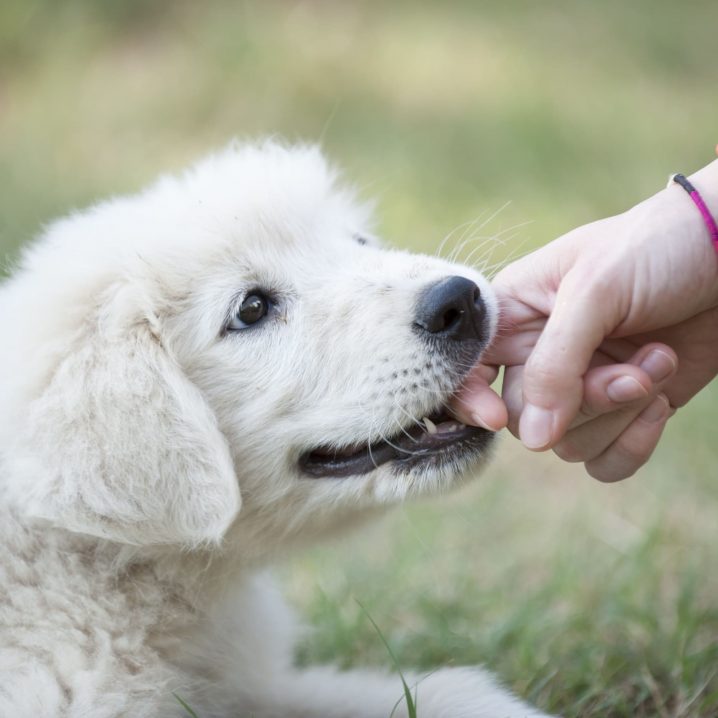
- POPSUGAR Australia
- Living
- OMG, My Puppy Is Destroying Me With His Sharp, Small Teeth – How Do I Make It Stop?
OMG, My Puppy Is Destroying Me With His Sharp, Small Teeth – How Do I Make It Stop?

There is arguably nothing cuter than a puppy. Tiny little paws, big eyes, soft fur, and – as most new puppy owners quickly discover – razor-sharp teeth that will quickly have you questioning whether you brought home a labrador retriever or a great white shark. Puppies bite and nibble; it’s part of what they do. The trick is training them out of this painful little habit.
My husband and I both grew up with dogs and have also had a number of dogs together. One thing we’ve learned is that while puppies do inevitably bite and gnaw, it’s 100 percent possible to get them to stop. We’ve also realized that effectively getting them to stop isn’t always a one-size-fits-all solution. We’ve learned that, for us, we’re most successful in training our puppies not to bite and nip after we’ve gotten to know the dog on an individual level, learning what drives them and adjusting the training accordingly.
When we got our most recent puppy, a lovable pitt/boxer/rottweiler mix named Albie, we learned that he loved being around people more than anything else. If he would gnaw or nip, we would sternly tell him “no” and give him a toy to chew instead. We would repeat this three times. On the third instance, we would put him in his crate for a five-minute timeout. He didn’t enjoy being away from people and quickly learned that to stay out of his crate and continue socializing, he had to stop nipping. To learn more about why puppies instinctively bite and gain insight on other techniques dog owners can use to help train their little buddies out of this painful habit, POPSUGAR spoke with dog trainer and vet Alyssa Cornelius, DVM, and Frank DeSimone, owner of Alpha Obedience Dog Training. Here’s what they had to say.
Related: Training a Puppy Is a Process – Here's the Timeline You Can Expect, According to Vets
Why Do Puppies Bite or Nip?
Dr. Cornelius explained that there are two different kinds of natural “biting” behaviors in puppies: the first being more of a nip and the second being more of a deliberate biting or chewing tendency. “One reason a puppy would bite is because they’re teething,” she explained. “They want to put their mouth on anything they can to ease the discomfort.” The second reason – and one that leads to more active biting or chewing – can be a result of boredom. “If a puppy isn’t getting enough mental stimulation and physical exercise, they often turn to an oral fixation to keep themselves occupied. This is when they can start actively chewing shoes and furniture.”
DeSimone explained that puppies also use their mouths to learn about the world around them. “It’s important to pay attention to your puppy’s body language and temperament when they bite and nip and also pay attention to your surroundings. Is something triggering them? Are they trying to play? Are they trying to interact and get your attention?” He emphasized that paying attention to your unique dog and situation can help identify the root cause of the behavior.
Do Puppies Stop Biting on Their Own?
“While puppies may stop nipping on their own, it’s important to remember that every experience your puppy has in its life is a training opportunity,” Dr. Cornelius explained. “They may stop on their own, but if you actively work to modify their behavior, the biting and nipping will stop much sooner.”
What Can Dog Owners Do to Train Their Puppies to Stop Biting?
To help wean puppies of their biting habits, Dr. Cornelius recommends providing them with appropriate things to chew on, such as age-appropriate toys and bones (she recommends Kong products and Nylabones). “When they start to nip and bite, immediately redirect them to one of their toys. When they chew the toy, reward them with positive commands, telling them ‘good toy’ or ‘good bone.'” She also stressed the importance of exercise in mitigating boredom chewing. “Make sure you’re actively getting them out and about,” she said. “Doing some active training will also tire them out.” She also provided crate training as a productive means of helping to modify behavior, using a dog’s crate as a safe, temporary timeout space when necessary. On a similar note, DeSimone encourages dog owners to redirect the puppy’s attention by giving them a job. “Whether it be an obedience command, playing with a toy, or interacting with you, this helps the dog focus on something other than biting.”
What Should Dog Owners Avoid When Training Their Puppies Not to Bite?
“You never want to use negative punishment,” Dr. Cornelius explained. “Physical aggression from a pet owner can escalate poor behavior. If you get frustrated, remove yourself from the situation. Give yourself some time to cool down.” DeSimone reiterated this mentality and listed hitting, spanking, and nose swatting all as negative owner behavior, explaining that all of these habits could lead to fearful aggression in the future. Both Dr. Cornelius and DeSimone emphasized that positive reinforcement is usually the most effective and healthy way to go about training.

